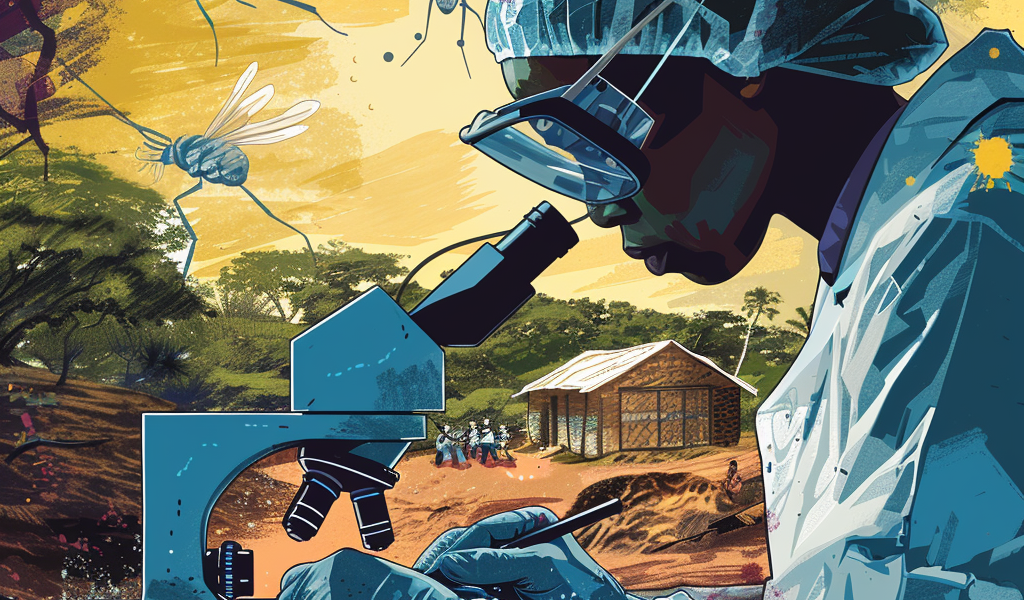Urgent Action Required to Combat Drug-Resistant Malaria in Africa
Scientists are sounding the alarm over the escalating threat of drug-resistant malaria in Africa, warning that millions of lives could be at stake if immediate and significant measures are not taken. The alarming rise of malaria parasites that are resistant to artemisinin, a crucial antimalarial drug, has been documented in East Africa, prompting calls for urgent intervention from the global health community.
Recent research indicates that resistance levels have surged dramatically in just three years, with some regions experiencing an increase from less than 1% to over 20% of malaria cases caused by resistant strains. This troubling trend echoes past experiences in Africa when the spread of drug resistance led to a catastrophic rise in malaria-related fatalities, particularly among children.
A collective of 28 prominent malaria researchers from ten different countries has issued a call to action in the journal Science, emphasizing the need for immediate response to this growing crisis. The researchers highlight that artemisinin is the cornerstone of current malaria treatment, and the emergence of resistant parasites poses a grave threat to public health.
The first instances of artemisinin resistance in Africa were identified in Rwanda, with subsequent cases emerging in Uganda and Eritrea. These resistant parasites have not only proliferated within their countries but have also crossed borders, leading to a concerning situation where more than 10% of malaria cases in Ethiopia, Eritrea, Rwanda, Uganda, and Tanzania are now attributed to resistant strains.
Professor Olugbenga Mokuolu from the University of Ilorin in Nigeria has emphasized the urgency of the situation, stating, “Now is the time to act before millions of people die due to increasingly ineffective antimalarial treatments.” The rapid increase in resistance is particularly alarming; in 2016, resistant strains were scarcely detected in northern Uganda, but by 2019, over 20% of tested parasites in several regions were found to be resistant.
Dr. Mehul Dhorda from the Mahidol Oxford Tropical Medicine Research Unit in Thailand has noted that the further spread of these resistant parasites appears to be unavoidable. He cautioned that while the pace of this spread remains uncertain, historical precedents suggest a grim outlook. Similar patterns were observed in Southeast Asia, where artemisinin-based treatments began to fail after a decade of resistance development.
The history of malaria treatment resistance in Africa serves as a stark warning. In the 1970s, resistance to chloroquine emerged in East Africa, spreading to the west coast by the 1980s, resulting in a dramatic increase in malaria deaths from approximately 493,000 in 1980 to 1.6 million by 2004. Dr. Dhorda expressed hope that the same fate would not befall Africa again, stating, “If artemisinin combination therapy starts failing, then cases and deaths will go up.”
In light of the growing threat, the group of scientists has proposed a series of recommendations aimed at combating both the resistant parasites and the mosquitoes that transmit the disease. One significant suggestion is to incorporate a third drug into the artemisinin combination therapy. This approach aims to complicate the parasites’ ability to develop resistance, thereby preserving the efficacy of current treatments.
While implementing these recommendations may incur additional costs, Dr. Dhorda argues that investing in effective malaria control now is crucial. He stated, “We might spend a little more now, but if not, the consequences could be dire.”
The situation calls for a coordinated global response, with an emphasis on funding, research, and innovative strategies to combat the spread of drug-resistant malaria. As the threat looms large, the health of millions hangs in the balance, underscoring the urgent need for action in the fight against this deadly disease.





